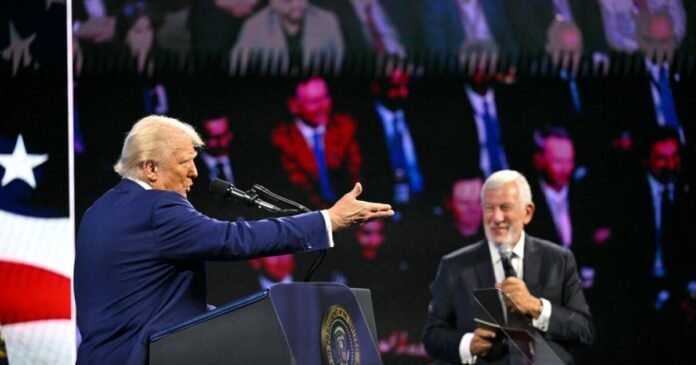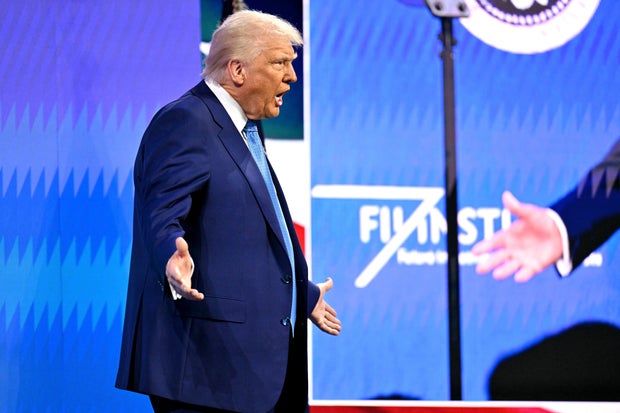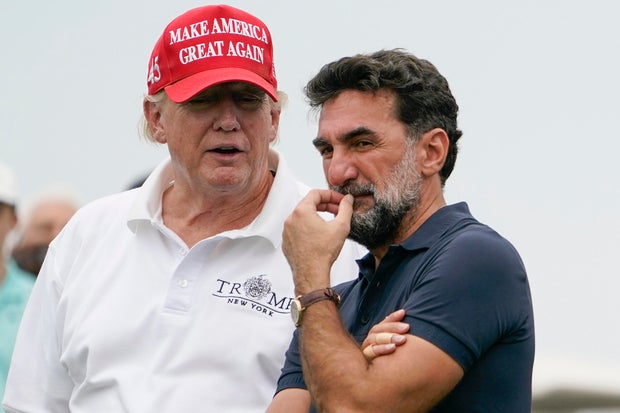Washington — President Trump spoke at an investment conference in Miami sponsored by Saudi government entities on Wednesday, an address that transpired as the Trump Organization seeks to expand its real estate empire in Saudi Arabia and as the president looks to strengthen ties with the Middle East partner.
The president’s speech came a day after the U.S. and Russia held talks in the Saudi capital of Riyadh on how to end the war in Ukraine, and the administration is seeking Saudi Arabia’s cooperation on a range of issues, including the war in Gaza. Saudi Crown Prince Mohammed bin Salman vowed to invest $600 billion in the U.S. over the next four years in a phone call with Mr. Trump shortly after he took office in January.
ROBERTO SCHMIDT/AFP via Getty Images
The FII PRIORITY Summit in Miami Beach is billed as an opportunity for “thought leaders, investors and policymakers” to come together and “unleash extraordinary value creation.” The Saudi Public Investment Fund is the main backer of the Miami conference, along with other Saudi government entities, including the Saudi Ministry of Investment and Riyad Bank, which the Saudi government controls.
Led by the crown prince, the Saudi Public Investment Fund reportedly invested $2 billion in Trump son-in-law Jared Kushner’s private equity firm after Mr. Trump left the White House in 2021. The fund is also a major backer of LIV Golf, which has held several tournaments at Trump golf courses.
The Trump family businesses’ ties with the Saudis raise questions about why he’s delivering the speech, and whether the president’s business interests might influence how he manages the relationship with the nation’s authoritarian leadership.
“You kind of have to question when you see something like this, is this being done to advance Trump’s business interests, or is there a reason America wants a president there?” Jordan Libowitz, vice president of communications for the Citizens for Responsible Ethics in Government or CREW, said of Mr. Trump’s speech.
“The president’s involved in business deals in a foreign country and you’ve got to wonder, what’s he putting first, his business or Americans’?” Libowitz asked.
The president began his speech by touting his properties in the Miami area, before mentioning Middle Eastern leaders, but he only acknowledged Saudi Arabia and its leaders by name. The president nodded “in particular the kingdom of Saudi Arabia, a special place with special leaders” and mentioned Saudi finance minister Mohammad Al-Jadaan.
Mr. Trump pointed out that the Saudi ambassador to the U.S., Princess Reema Bandar Al-Saud, was seated next to his right-hand man, billionaire Elon Musk in the audience. He also gave a nod to his son-in-law and former Middle East point person, Jared Kushner, “a very special guy.”
He thanked Saudi Arabia for doing a “great job” in hosting the talks on Russia and Ukraine and the crown prince, and he again bashed Ukrainian president Volodymyr Zelenskyy as a “dictator.” The White House also said bin Salman played a role in the recent release of an American detained in Russia, Marc Fogel.
The president reiterated his plan to give businesses that manufacture their products in the U.S. lower tax corporate tax rates.
“I come today with a simple message for business leaders from all across the nation and all around the world,” Mr. Trump said. “If you want to build the future, push boundaries, unleash breakthroughs, transform industries or make a fortune. Do you want to make a fortune? Most of you have already made a fortune, I don’t want to say. There’s no better place on earth than the current and future United States of America under a certain president named Donald J. Trump,” he said.
The president also lauded his administration’s work to deport illegal immigrants, and Musk’s work to slash the size of government — his goal is to cut up to $2 trillion in spending. The president floated the idea of giving 20% of the savings achieved by the Department of Government Efficiency back to Americans.
“We’re thinking about giving 20% back to the American citizens and 20% back to pay down debt,” Mr. Trump said, although 20% of those savings would only put a small dent in the federal debt, which is currently over $36 trillion. It’s unclear where the other 60% would go.
The institute hosting the Miami conference did not immediately respond to a request for comment from CBS News, nor did the Saudi embassy.
Asked why the president chose to speak at the event, a White House official told CBS News ahead of the speech that the president would be “encouraging investment in the United States.”
Associated Press
Business ties to the Saudis
The president handed over day-to-day operations of the Trump Organization to his children and placed his assets in a trust before taking office in January, similar to an arrangement he made before his first term. But he has declined to fully divest from his business interests, raising questions about the potential for conflicts of interest in his dealings with foreign entities.
Last year, the Trump Organization announced plans for the development of a Trump Tower in Jeddah, a major Saudi city along the Red Sea.
Eric Trump, the president’s son and the executive vice president of the Trump Organization, announced the Jeddah deal in December. He told Reuters that the Trump Organization also has plans for a Trump-branded property in Riyadh.
“What I’ll tell you is one of them will definitely be a tower,” Eric Trump told the news agency, declining to offer other details.
Kushner, who handled Middle East affairs for Mr. Trump in the White House during the first Trump term, grew close with the Saudi crown prince, despite the CIA assessing as far back as 2018 that bin Salman, known as MBS, approved the murder of Washington Post columnist and U.S. resident Jamal Khashoggi.
Kushner recently dismissed any conflict of interest concerns about the Saudi investment fund’s stake in his private equity firm, Affinity Partners. He also scoffed when asked if he believed a declassified U.S. intelligence report released in 2021 that found the crown prince approved the killing of Khashoggi. Kushner said he has not seen the report.
“Are we really still doing this?” Kushner first replied last week when asked if he believed the U.S. intelligence report pointing to MBS.
The Saudi-funded LIV Golf league, which has held talks to merge with the PGA Tour, is scheduled to hold a tournament at the Trump National Doral in April, after hosting multiple events at Trump properties in recent years. Mr. Trump has deflected criticism of his involvement with the Saudi-backed tournament by casting doubt on the Saudis’ involvement in the 9/11 terrorist attacks, saying, “Well, nobody’s gotten to the bottom of 9/11, unfortunately, and they should have.”
Seth Wenig / AP
Human Rights Watch specifically names the Saudis’ involvement with LIV as a serious concern, saying the country is trying to “‘sportswash’ its egregious human rights record.”
Earlier this month, Mr. Trump met with the PGA Tour commissioner Jay Monahan at the White House, with a potential deal between the PGA Tour and LIV subject to scrutiny by federal regulators.
“We are grateful that his leadership has brought us closer to a final deal, paving the way for reunification of men’s professional golf,” Monahan and players Tiger Woods and Adam Scott said in a statement after the meeting.
Ethical and national security questions
Libowitz suggested that a sitting U.S. president with business interests that involve a foreign government complicates the relationship.
“Look, you’re not going to be able to do major business deals in a country, particularly an authoritarian country, if that country doesn’t want you to,” Libowitz said.
Presidents aren’t subject to the federal statute prohibiting federal employees from participating in government matters that could affect their financial interests or those of their families, said Jessica Tillipman, associate dean for government procurement law studies at the George Washington University Law School.
“The president just doesn’t have any of those limitations that you would traditionally see of an executive branch federal employee,” Tillipman said.
Still, it’s traditionally been a norm that a president would divest himself from his business interests, or place some interests in a blind trust.
“We’ve seen no indication that the president intends to separate himself from his existing financial interests,” Tillipman said. “Again, he’s not legally required to do any of this.”
Scott Amey, general counsel for the Project on Government Oversight, said Mr. Trump’s failure to properly divest from his business holdings raise not only ethical concerns, but national security ones.
“Trump has not properly divested from his business holdings and recently announced a new hotel in Saudi Arabia,” Amey said. “The Trump Organization’s website sells tickets to the Saudi-owned golf league event at Trump’s Miami golf course. Every meeting that involves current or potential business partners or investors is a conflict. These entanglements raise numerous ethics concerns as well as national security concerns because we are talking about Saudi interests where there is even less of a distinction between the ruling family and their businesses.”
Read More: Trump speech at Saudi-backed event highlights questions over business ties





